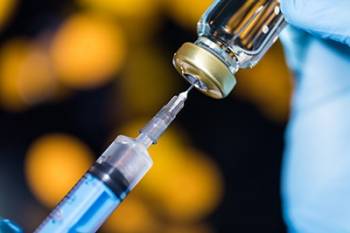Testing vaccine candidates quickly with lab-grown mini-organs
PressPacs April 12, 2023 8:00 AM EDT
FOR IMMEDIATE RELEASE
“Profiling Germinal Center-Like B Cell Responses to Conjugate Vaccines Using Synthetic Immune Organoids”
ACS Central Science

New vaccine candidates could be developed more quickly with a novel immune cell testing platform.
F8 studio/Shutterstock.com
Developing and testing new treatments or vaccines for humans almost always requires animal trials, but these experiments can sometimes take years to complete and can raise ethical concerns about the animals’ treatment. Now, researchers reporting in ACS Central Science have developed a new testing platform that encapsulates B cells — some of the most important components of the immune system — into miniature “organoids” to make vaccine screening quicker and greatly reduce the number of animals needed.
Vaccines introduce the immune system to an antigen, which can be either part or all of a virus or bacterium, allowing the body to prepare itself for a future exposure by programming its B cells to make antibodies against the antigen. Certain bacteria coat themselves in a polysaccharide “disguise,” however, requiring specialized conjugate vaccines, such as those that protect against pneumonia and meningitis. In this type of approach, a piece of the antigenic polysaccharide is attached, or conjugated, to a carrier protein the body can recognize. But exactly how conjugate vaccines interact with B cells to induce an immune response isn’t fully understood.
The traditional way of testing vaccines involves injecting them into animals and waiting weeks or months for the result. And when developing a whole new class of vaccine or focusing on a new target, scientists often need to evaluate many vaccine candidates, requiring numerous animal studies. To speed up the process and address ethical concerns, researchers have begun exploring the use of organoids, which are small groups of cells that act like miniaturized organs, creating a simulated environment that reflects in vivo conditions. Hundreds of immune cell organoids can be constructed from the spleen of a single animal, greatly increasing testing throughput — which could help researchers keep up with the large numbers of compounds they can create and need to screen. So, Matthew DeLisa, Ankur Singh and colleagues wanted to see whether this method would provide results similar to those from animal experiments and whether the platform could be used to screen large numbers of glycoconjugate vaccine candidates.
To construct organoids, the researchers isolated B cells from mouse spleens, added cellular signaling molecules and structural components, then encapsulated everything in a synthetic hydrogel matrix. Next, they prepared conjugate vaccine candidates targeting the bacterium responsible for tularemia, or “rabbit fever,” for which an approved vaccine does not currently exist. Candidates were tested using both traditional in vivo mouse trials and the new organoid platform. The B cells reacted similarly in both formats and also provided insights into the several biochemical changes that occur as the cells mature into antibody-producing cells. As a result, the team found that the platform could be used to identify B cell clones that generate highly antigen-specific antibodies, which have a wide variety of potential applications. Though this work is preliminary, the researchers say that the organoid platform could help reduce the time it takes for new conjugate vaccines to be developed and evaluated.
The authors acknowledge funding from the Bill and Melinda Gates Foundation, the Defense Threat Reduction Agency, the National Institutes of Health, the Wellcome Leap HOPE Program and the National Science Foundation.
###
The American Chemical Society (ACS) is a nonprofit organization chartered by the U.S. Congress. ACS’ mission is to advance the broader chemistry enterprise and its practitioners for the benefit of Earth and all its people. The Society is a global leader in promoting excellence in science education and providing access to chemistry-related information and research through its multiple research solutions, peer-reviewed journals, scientific conferences, eBooks and weekly news periodical Chemical & Engineering News. ACS journals are among the most cited, most trusted and most read within the scientific literature; however, ACS itself does not conduct chemical research. As a leader in scientific information solutions, its CAS division partners with global innovators to accelerate breakthroughs by curating, connecting and analyzing the world’s scientific knowledge. ACS’ main offices are in Washington, D.C., and Columbus, Ohio.
To automatically receive press releases from the American Chemical Society, contact newsroom@acs.org.
Note: ACS does not conduct research, but publishes and publicizes peer-reviewed scientific studies.